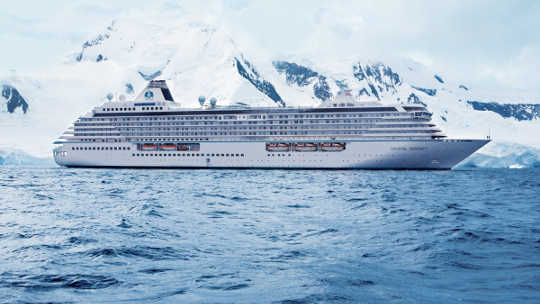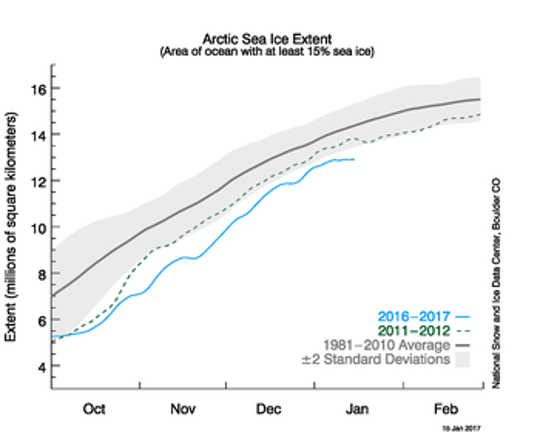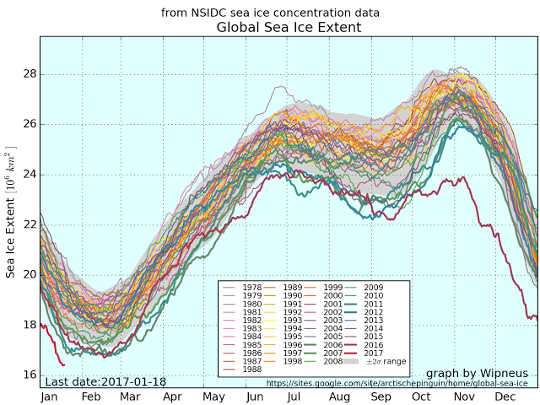
The media and the general public pay little attention to this climate event that occurs around mid March every year. That event is the Arctic ice maximum which refers to any area that contains at least 15% ice in the Arctic.
Climate scientists and others interested, on the other hand, watch the freeze and melt throughout the year. The daily readings can be found at The National Snow and Ice Data Center (NSIDC). It also has the information in an easy-to-understand visual format for Antarctica and Greenland as well as the Arctic.
I have written that I am as certain of global warming as I am about the existence of gravity. One of the reason for my certainty comes from watching the data of the daily freeze and melt of the Arctic for the past 10 or so years.

As you can see above, the ice extent is tracking well below the 1981-2010 average (solid black line) and the low of 2011-2012. Whether the turn from accumulation to melt will occur at a record early date is anybody's guess now. What is known is that water and air temperatures have been extraordinarily warm at times this winter.
We often heard stories during the cold war of American and Russian subs playing cat and mouse under the vast stretches of ice many meters thick. A good friend was in the submarine corps and he told me the stories of being submerged for months.
The history books tell of ancient and not so ancient mariners being caught in the freezing ice while trying to find a way through the then icebound Northwest Passage, for a shorter route to the Far East than around the tip of Africa or South America. Submarines today will have to search far and wide in the summer to find really thick ice that requires them to "break through".
We are simply not accustomed to having no ice in the Arctic. As for the Northwest Passage? These days, tankers and even tourist cruise ships are not out of the question for part of the year.
 But why all the interest in the Arctic? It's just a wasteland right? Well yes, there aren't many people there. And yes it still gets pretty damn cold. Some have described the Arctic as the earth's air conditioner. And the Arctic is warming about twice as fast as the rest of the planet. Why is it important then?
But why all the interest in the Arctic? It's just a wasteland right? Well yes, there aren't many people there. And yes it still gets pretty damn cold. Some have described the Arctic as the earth's air conditioner. And the Arctic is warming about twice as fast as the rest of the planet. Why is it important then?
The Arctic has been ice free several times in the geological past. In those ancient times the land areas were covered with rich vegetation and the ocean with life and vegetation typical of warmer climates. As the Arctic cooled and returned to an icy state the vegetation died and the carbon was locked in the permafrost on land and in hydrates in the ocean. These vast stores of greenhouse gases stay locked in place as long as the temperature is cold enough.
As the Arctic warms, these long frozen areas begin to release their greenhouse gases into the atmosphere which then thickens the virtual blanket of gases around the earth that then traps even more of the sun's heat. And the heating goes on.
Just as the dark roof of a house absorbs the heat from the sun and a white roof reflects the sun's heat, the same principle is true in the Arctic. The ocean and land areas that contain ice and snow reflect more of the sun's rays back into space while the open water absorbs more. As the ice melts, the water warms, the frozen gases are released, and the heating goes on.
It takes a lot of heat to melt ice. Once the ice is gone, the same amount of heat will raise the water temperature at a quicker pace than before. And the whole process accelerates. If out of control, it can become runaway global warming.
March is nearly here and Arctic ice area has been lower comparably for most of the year. The amount of ice at the turn in March is critical as this will eventually determine when the Arctic will be virtuallyt ice free in the summer. Once this is achieved the Arctic will remain ice free for longer and longer periods. Some climate scientists have estimated we could see an ice free Arctic in the next few years.
Important? Yes, it is a really big deal.
{youtube}Vj1G9gqhkYA{/youtube}
Noam Chomsky has stated the two greatest threats to humanity are nuclear war and climate change. So far we have nuclear war under control but climate change not at all. What is clear is if we make a mistake with either, there is no recovery.
For those that wish a more technical and comprehensive explanation of the importance of the events in the Arctic, watch this 3-part recent video produced by climate scientist Paul Beckwith of the University of Ottawa.
Our Climate Change Emergency & Three-Legged Barstool Survival: Part 1 of 3
Our Climate Change Emergency & Three-Legged Barstool Survival: Part 2 of 3
Our Climate Change Emergency & Three-Legged Barstool Survival: Part 3 of 3
About the Author
 Robert Jennings is co-publisher of InnerSelf.com with his wife Marie T Russell. He attended the University of Florida, Southern Technical Institute, and the University of Central Florida with studies in real estate, urban development, finance, architectural engineering, and elementary education. He was a member of the US Marine Corps and The US Army having commanded a field artillery battery in Germany. He worked in real estate finance, construction and development for 25 years before starting InnerSelf.com in 1996.
Robert Jennings is co-publisher of InnerSelf.com with his wife Marie T Russell. He attended the University of Florida, Southern Technical Institute, and the University of Central Florida with studies in real estate, urban development, finance, architectural engineering, and elementary education. He was a member of the US Marine Corps and The US Army having commanded a field artillery battery in Germany. He worked in real estate finance, construction and development for 25 years before starting InnerSelf.com in 1996.
InnerSelf is dedicated to sharing information that allows people to make educated and insightful choices in their personal life, for the good of the commons, and for the well-being of the planet. InnerSelf Magazine is in its 30+year of publication in either print (1984-1995) or online as InnerSelf.com. Please support our work.
Creative Commons 4.0
This article is licensed under a Creative Commons Attribution-Share Alike 4.0 License. Attribute the author Robert Jennings, InnerSelf.com. Link back to the article This article originally appeared on InnerSelf.com
Related Books:
at InnerSelf Market and Amazon




















